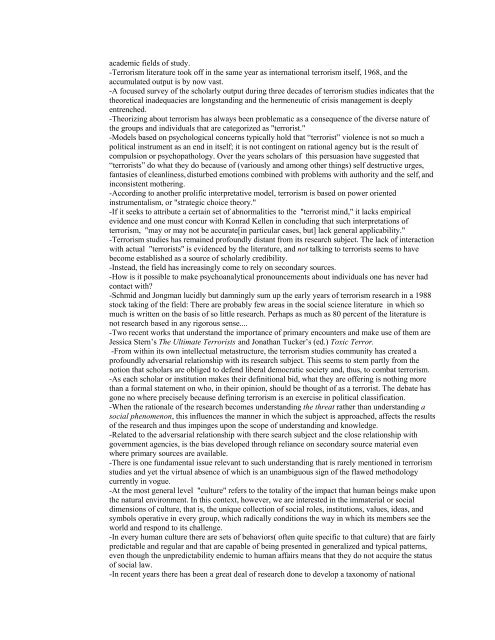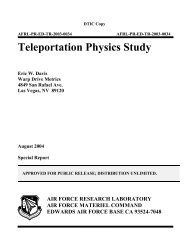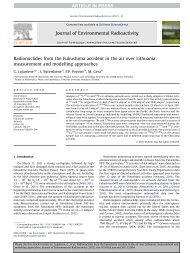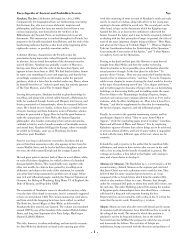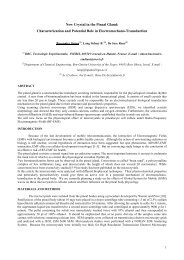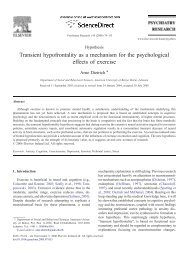Psychology of Terrorism - National Criminal Justice Reference Service
Psychology of Terrorism - National Criminal Justice Reference Service
Psychology of Terrorism - National Criminal Justice Reference Service
You also want an ePaper? Increase the reach of your titles
YUMPU automatically turns print PDFs into web optimized ePapers that Google loves.
academic fields <strong>of</strong> study.-<strong>Terrorism</strong> literature took <strong>of</strong>f in the same year as international terrorism itself, 1968, and theaccumulated output is by now vast.-A focused survey <strong>of</strong> the scholarly output during three decades <strong>of</strong> terrorism studies indicates that thetheoretical inadequacies are longstanding and the hermeneutic <strong>of</strong> crisis management is deeplyentrenched.-Theorizing about terrorism has always been problematic as a consequence <strong>of</strong> the diverse nature <strong>of</strong>the groups and individuals that are categorized as "terrorist."-Models based on psychological concerns typically hold that “terrorist” violence is not so much apolitical instrument as an end in itself; it is not contingent on rational agency but is the result <strong>of</strong>compulsion or psychopathology. Over the years scholars <strong>of</strong> this persuasion have suggested that“terrorists” do what they do because <strong>of</strong> (variously and among other things) self destructive urges,fantasies <strong>of</strong> cleanliness, disturbed emotions combined with problems with authority and the self, andinconsistent mothering.-According to another prolific interpretative model, terrorism is based on power orientedinstrumentalism, or "strategic choice theory."-If it seeks to attribute a certain set <strong>of</strong> abnormalities to the "terrorist mind," it lacks empiricalevidence and one must concur with Konrad Kellen in concluding that such interpretations <strong>of</strong>terrorism, "may or may not be accurate[in particular cases, but] lack general applicability."-<strong>Terrorism</strong> studies has remained pr<strong>of</strong>oundly distant from its research subject. The lack <strong>of</strong> interactionwith actual "terrorists" is evidenced by the literature, and not talking to terrorists seems to havebecome established as a source <strong>of</strong> scholarly credibility.-Instead, the field has increasingly come to rely on secondary sources.-How is it possible to make psychoanalytical pronouncements about individuals one has never hadcontact with?-Schmid and Jongman lucidly but damningly sum up the early years <strong>of</strong> terrorism research in a 1988stock taking <strong>of</strong> the field: There are probably few areas in the social science literature in which somuch is written on the basis <strong>of</strong> so little research. Perhaps as much as 80 percent <strong>of</strong> the literature isnot research based in any rigorous sense....-Two recent works that understand the importance <strong>of</strong> primary encounters and make use <strong>of</strong> them areJessica Stern’s The Ultimate Terrorists and Jonathan Tucker’s (ed.) Toxic Terror.-From within its own intellectual metastructure, the terrorism studies community has created apr<strong>of</strong>oundly adversarial relationship with its research subject. This seems to stem partly from thenotion that scholars are obliged to defend liberal democratic society and, thus, to combat terrorism.-As each scholar or institution makes their definitional bid, what they are <strong>of</strong>fering is nothing morethan a formal statement on who, in their opinion, should be thought <strong>of</strong> as a terrorist. The debate hasgone no where precisely because defining terrorism is an exercise in political classification.-When the rationale <strong>of</strong> the research becomes understanding the threat rather than understanding asocial phenomenon, this influences the manner in which the subject is approached, affects the results<strong>of</strong> the research and thus impinges upon the scope <strong>of</strong> understanding and knowledge.-Related to the adversarial relationship with there search subject and the close relationship withgovernment agencies, is the bias developed through reliance on secondary source material evenwhere primary sources are available.-There is one fundamental issue relevant to such understanding that is rarely mentioned in terrorismstudies and yet the virtual absence <strong>of</strong> which is an unambiguous sign <strong>of</strong> the flawed methodologycurrently in vogue.-At the most general level "culture" refers to the totality <strong>of</strong> the impact that human beings make uponthe natural environment. In this context, however, we are interested in the immaterial or socialdimensions <strong>of</strong> culture, that is, the unique collection <strong>of</strong> social roles, institutions, values, ideas, andsymbols operative in every group, which radically conditions the way in which its members see theworld and respond to its challenge.-In every human culture there are sets <strong>of</strong> behaviors( <strong>of</strong>ten quite specific to that culture) that are fairlypredictable and regular and that are capable <strong>of</strong> being presented in generalized and typical patterns,even though the unpredictability endemic to human affairs means that they do not acquire the status<strong>of</strong> social law.-In recent years there has been a great deal <strong>of</strong> research done to develop a taxonomy <strong>of</strong> national


